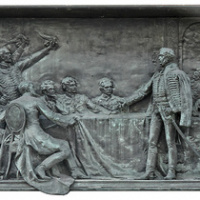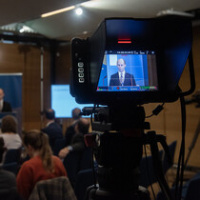Research Groups 2022-2026
- MTA-SZTR Research Group on Geography Teaching and Learning
- MTA-ELTE Language-Learning Disorders Research Group
- MTA-DE Early Science Learning Research Group
- MTA-PTE Reading Fluency and Comprehension Research Group
- MTA-ELTE Theory of Learning Mathematics Research Group
MTA-SZTE Research Group on Geography Teaching and Learning
RG Leader: Anett Kádár
Anett Kádár has worked as an assistant professor and lecturer at the Institute of Geography and Geosciences of the University of Szeged since 2023. Her primary task is to instruct and supervise students wishing to become Geography teachers both at primary and secondary school levels.
She graduated from the University of Szeged in 2001 as a secondary school teacher of Geography. She obtained a degree in American Studies in 2002, and a postgraduate degree in Translation and Interpreting in 2015. She earned her PhD degree in the Doctoral School of Earth Sciences at the University of Szeged in 2019. From 2001 to 2015, she was a teacher of Geography and English at the Bibó István Secondary Grammar School in Kiskunhalas, and then worked in adult education (Kiskunhalas Police Headquarters of Bács-Kiskun County), vocational education (Dékáni Árpád Technikum of Kiskunhalas SZC) and primary school (Sallai István Elementary School in Kisszállás). Between 2020 and 2023, she was a teacher of Geography and English at the Kiskunhalasi Felsővárosi Primary School, where she is currently a part-time teacher.
In 2022, the Szilády Áron Society in Kiskunhalas awarded her with the Pro Iuventute Prize for her outstanding pedagogical work among students during her career in public education. Since its launch (2021), she has coached a national finalist team in the Solve for Tomorrow challenge organised by Samsung and Edisonkids. She has enriched her pedagogical work by successfully participating in several professional development courses. She has been a member of the MTA-SZTE Geography Methodology Research Group since 2017, and was involved in the writing of the research group’s educational supplementary material: "Discover, Think! Hungary's geography in a different way” (book). She participated in the work of Oktatás2030 in 2018-2019. She also co-authored a geography textbook and workbook written for students with special educational needs (2019). Since 2023, she has been a member of the international COMPOUNDS project at the Humboldt-Universität zu Berlin, Germany.
Research Area
The main objectives of the research group are to identify the map reading strategies of students of different ages, using an internationally validated map reading assessment tool (source: Humboldt-Universität zu Berlin), and to further refine a map literacy competence model developed by researchers at Humboldt University. Based on the results of the measurements using an eye-tracking device, the research group will formulate recommendations for improving students' spatial orientation and map reading strategies, thus improving the quality of teaching map use and map reading in primary and secondary schools as well as the quality of traditional and digital educational material development and dissemination. In relation to the main research objectives, the design of development tasks and methods related to the use of virtual reality (VR) spaces and other educational applications (e.g. Okosdoboz) will be pursued, including the creation and validation of proposals and tasks related to the development of spatial orientation and map reading strategies. The work of the research group also aims to increase the effectiveness and efficiency of these materials in classroom settings, and to improve students' map reading skills in everyday life.
The research group's own website
***
MTA-ELTE Language-Learning Disorders Research Group
RG Leader: Bence Kas
Bence Kas is an Associate Professor at the Bárczi Gusztáv Faculty of Special Education, Eötvös Loránd University, and Senior Research Fellow at the Hungarian Research Centre for Linguistics.
During his studies, he obtained a BA in Special Education (Speech and Language Therapy) and an MA in Theoretical Linguistics. He holds a PhD degree from the Doctoral Programme in Psychology (Cognitive Psychology) of the Budapest University of Technology and Economics. He has been involved in and led several national and international research projects funded by COST (European Cooperation in the field of Scientific and Technical Research), the National Research, Development and Innovation Office, TÁMOP and other organisations and funds. He was also a recipient of the MTA Bolyai János Research Fellowship and the TÁMOP "National Excellence Programme" Erdős Pál Young Researcher Fellowship.
His research projects have focused on the social determinants of early language acquisition, language-specific features and causes of language development disorders. In addition to basic theoretical research, he is a leading researcher in the development of diagnostic instruments for speech and language therapy, his major achievements include the Hungarian adaptation of the MacArthur-Bates Communicative Developmental Inventory (HCDI), the development of the SZÓL-E (Screening Procedure for Preschool Speech and Language Therapy) screening tool and the Complex Test of Spoken Language Skills (KOBAK).
At Bárczi Gusztáv Faculty of Special Education, Eötvös Loránd University, he is the head of the Speech and Language Therapy specialisation (within the Special Education BA programme) and the Speech and Language Therapy MA programme and supervisor in the Doctoral School of Education at ELTE. He has almost 100 publication records in MTMT, 10 of which are ranked journal articles published in English language. The number of independent references to his publications is over 400.
Research area
The research group was founded within the Cognitive and Language Development Workshop at the Bárczi Gusztáv Faculty of Special Education at ELTE. The core members of the research team are experts in several disciplines (cognitive neuropsychology, linguistics, speech and language therapy, and music therapy). The planned research work builds on several previous joint projects, in which the team members have collaborated in different roles and published jointly in Hungarian and English. The proposed research will combine basic research, methodological development, assessments of impact of diagnostics and intervention, resulting in innovative screening procedures and intervention methods for children with language differences and developmental language disorders to be applied in the professional practice of speech and language therapists and teachers. The collaborative work of researchers, doctoral students, academics and practitioners in the research team will ensure that knowledge-based and evidence-based practice is implemented and that lessons learned are fed back into academic training and further theoretical research.
The research group's own website
***
MTA-DE Early Science Learning Research Group
RG Leader: Ibolya Markóczi Revák
Ibolya Markóczi Revák graduated as a biology- chemistry teacher for secondary school at Kossuth Lajos University Debrecen in 1986. For nearly 30 years she has been preparing biology pre-service teachers for methodology of biology teaching, responsible for the basic biology subjects of biologist and biochemical engineer students, instructor of Hungarian and English language subjects. Lecturer of pedagogy of enviromental education, didactical problems of science education and development of problem-solving thinking for PhD students. She is responsible for the undivided and short-cycle biology, integrated natural and environmental sciences teacher training courses. Supervisor of 5 PhD students in UD Doctoral Program on Educational Sciences and Juhász-Nagy Pál Doctoral School. Under his leadership nearly 180 thesis and 6 papers were published related to National Scientific Students' Associations Conference of which three of the latter scored first and three second places. Research areas: scientific probelm-solving at primary and secondary level, science learning at primary level, influence of project method in science teaching, energy awareness at different levels of education. Participant in national and international research programs, hungarian leader and researcher in MÖB-DAAD, Hungarian German Research Exchange Program, 2004-2008 which examined the natural science conceptual knowledge and thinking of elementary school students. Member, group leader and professional implementer of several research projects related to education, environmental education and teacher training. Member of Subcommittee on subject pedagogy of Committee on Pedagogy at MTA then vice-chairman since 2015.
Research area
The aim of the research group is to investigate the cognitive, non-cognitive and socio-economic factors that underpin and influence the integrated scientific knowledge and attitude of primary school pupils in Grades 1-4, and to develop implement and evaluate the impact of a development programme incorporating the results of the research. The activities involve teachers and researchers in subject pedagogy, researchers in educational psychology, PhD students and primary school teachers. The publications summarising the results of the research, the teaching aids and documents including methods to support the learning process can be used in teacher and educator training as well as in the practice of teaching and education in primary schools.
The research group's own website
***
MTA-PTE Reading Fluency and Comprehension Research Group
RG Leader: János Steklács
János Steklács is an instructor, department head, and university professor at the Department of Educational Theory, Faculty of Humanities and Social Sciences, University of Pécs. He is also the head of the Doctoral Program in Educational Theory and Methodology at the Doctoral School of Education and Society at the University of Pécs. He obtained his degree in Hungarian language and literature from the Faculty of Humanities at the University of Pécs in 1996, and he earned his PhD and habilitation degrees in the Doctoral School of Linguistics there. His research interests include the examination of the process and system of reading teaching and learning, reading strategies, functional literacy, and the investigation of learning processes and effectiveness using eye-tracking technology. He has been a member and office-holder of numerous national and international professional organizations over the past two decades. He participated in the ADORE (Teaching Struggling Adolescent Readers in European Countries) research and development program, which defined educational principles for the European Union, as well as in several significant international and national research projects in the field of reading, learning and educational theory.
Research area
The aim of the research is to modernise the methods applied in the systems of literacy instructions in lower primary grades of Hungarian public education; to update teachers’ conceptual structure, and beliefs by theoretical, practical, and empirical classroom research. The main feature, basic principle of the planned research is that the research should begin in the classroom and they should work in classrooms as well. In our research, we are going to apply a number of attributes, factors indicating a change of paradigms which have not been introduced in Hungarian public education. Based on the research literature, the main fields of our research are assessment, evaluation of 1. reading literacy skills, 2. reading fluency, 3. reading strategies. In our view, the integrated interpretation of these three fields makes it possible to build literacy instruction on current theoretical foundations; it is also an aim that reading instruction should be able to support resilience and conform to the changing requirements of the society more efficiently that the present one; therefore, it could contribute to the success of the individual in everyday life and the realisation of equal opportunities.
Our work is supported by the fact that the members of our research group have been conducting research for more than a decade, and have already had a number of research findings in this field.
The research group's own website
***
MTA-ELTE Theory of Learning Mathematics Research Group
RG Leader: Csaba Szabo
Csaba Szabó is a professor of the Department of Algebra and Number Theory at ELTE. He graduated from the Fazekas Mihály High School in Budapest in 1983. As a high school student he solved a money-prize Paul Erdős problem with a classmate. Afterwards he graduated as a mathematician and mathematics teacher at the ELTE, and then as a candidate od sciences at the Scientific Qualification Committee of the Hungarian Academy of Sciences. He was awarded the István Széchenyi Professorial ScholarshipcIn 2007, he was awarded the Doctor of the Hungarian Academy of Sciences degree, his research being focused on the interfaces between different branches of algebra. In 2005, the National Council of Scientific Students awarded him the Master Teacher Gold Medal for his work in the Physics-Geography-Mathematics Section for his successful preparation of students. For him, this means the effective acquisition of long-term knowledge, skills and abilities (learning time, teacher energy invested). In 2016, he founded the cross-university Research Group on Learning Theory and Psychology of Mathematics, of which several students are members. Thanks to her numerous award-winning TDK students, in 2019 she was awarded the Master Teacher Gold Medal by the National Council of Scientific Students for his outstanding topic leadership in the section on Teaching and Learning Methods in Mathematics. In 2017 he was elected to be a member of the Education Committee of the European Mathematical Society.
Research area
The research areas of the MTA-ELTE Theory of Learning Mathematics Research Group encompass the examination of effective methods for presenting and teaching curriculum. Within this scope, we place particular emphasis on enhancing the efficiency of the mathematics learning process. Can it be achieved that students comprehend mathematics, whether willingly or not?
Our primary research domains include investigating the test-enhanced learning, development through boardgames, gamification, the utilization of interleaved problem sets, problem posing, exploring geometric conceptual development, bridging knowledge gaps, and enhancing spatial skills.
Among our members, there are over 30 teachers from 20 primary and secondary schools who engage in experiments with innovative knowledge transfer methods. We distinguish three main objectives: acquiring knowledge, boosting motivation and commitment, and nurturing thinking skills. Our goals include involving as many students and teachers as possible in the research process.
The research group's own website
***





